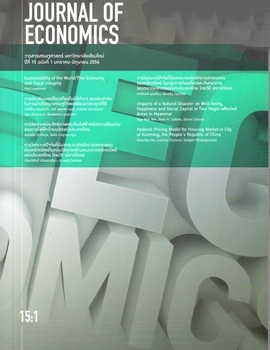การประเมินผลเปรียบเทียบในมิติต่างๆของประชาชน ในการนำปรัชญาเศรษฐกิจพอเพียงมาประยุกต์ใช้
Keywords:
ประเมินผล, ปรัชญาเศรษฐกิจพอเพียง, การประยุกต์, Evaluation, Sufficiency economy philosophy, ApplicationAbstract
วัตถุประสงค์หลักในการวิจัย ประการแรกเพื่อวัดระดับความรู้และความเข้าใจปรัชญาเศรษฐกิจพอเพียงของประชาชนในอาชีพต่างๆ ได้แก่ ประชาชนทั่วไป ประชาชนในภาคเกษตร ประชาชนในภาคบริการ ประชาชนในภาคอุตสาหกรรม และประชาชนในภาคราชการ ในหลักการ 3 ห่วง คือความพอประมาณ ความมีเหตุมีผล และการมีภูมิคุ้มกัน และ 2 เงื่อนไข คือ การมีความรู้และคุณธรรม ประการที่สองเพื่อศึกษาการนำหลักปรัชญาเศรษฐกิจพอเพียงมาประยุกต์ใช้ของประชาชนในมิติด้านต่างๆ 5 ด้าน คือ ด้านเศรษฐกิจ ด้านสังคม ด้านวัฒนธรรม ด้านสิ่งแวดล้อม และด้านการเรียนรู้แบบมีประสิทธิภาพและประสิทธิผล วิธีการศึกษาได้ใช้แบบสอบถาม สัมภาษณ์ประชาชน จำนวน 5,111 คน และใช้การสัมภาษณ์เชิงลึกในประชาชนที่ใช้ปรัชญาเศรษฐกิจ พอเพียงในการดำรงชีวิตเป็นกรณีศึกษา จำนวน 13 ตัวอย่าง ผลการศึกษา ในด้านความรู้และ ความเข้าใจปรัชญาเศรษฐกิจพอเพียงพบว่า ประชาชนในแทบทุกอาชีพมีความเข้าใจในหลักปรัชญา เศรษฐกิจพอเพียงอยู่ในระดับมากยกเว้นประชาชนในภาคเกษตรมีความเข้าใจในระดับปานกลาง แต่มีความเข้าใจผิดในหลักการอยู่หลายเรื่อง อาทิเช่น คิดว่าเป็นปรัชญาที่ใช้กับคนยากจน เป็นเรื่องเกี่ยวกับเศรษฐกิจเท่านั้น มิได้รวมด้านสังคม วัฒนธรรม และสิ่งแวดล้อมเป็นต้น การศึกษาการนำปรัชญาเศรษฐกิจพอเพียงมาประยุกต์ใช้ในมิติต่างๆกล่าวคือ ด้านเศรษฐกิจคือการมีรายได้เพียงพอ กับรายจ่ายและมีเหลือเก็บ ด้านสังคมคือการมีส่วนร่วมในกิจกรรมของสังคมและการปฏิบัติตนใน การอยู่ร่วมกันในสังคม ด้านวัฒนธรรมคือการปฏิบัติตนตามวัฒนธรรมไทยที่ดีงาม ด้านสิ่งแวดล้อม คือการปฏิบัติตนในเรื่องการกำจัดของเสียและด้านการอนุรักษ์พลังงาน และด้านการเรียนรู้แบบมี ประสิทธิภาพและประสิทธิผลคือการแสวงหาความรู้เพื่อเพิ่มพูนประสิทธิภาพของตนเอง ผลการศึกษาพบว่า ประชาชนทั่วไปนำมาประยุกต์ใช้ในระดับมากในทุกมิติประชาชนในภาคเกษตรและ ภาคบริการนำมาประยุกต์ใช้ในระดับปานกลาง โดยนำมาใช้มากในมิติด้านสังคม เช่นเดียวกันสำหรับเจ้าของ หรือผู้บริหารภาคอุตสาหกรรม นำมาประยุกต์ใช้ในระดับปานกลาง โดยนำมาใช้มากในมิติด้านสิ่งแวดล้อม ส่วนลูกจ้างภาคอุตสาหกรรม นำมาประยุกต์ใช้ในระดับปานกลาง และประชาชน ในภาคราชการ นำมาประยุกต์ใช้ในระดับมาก โดยนำมาใช้มากในมิติด้านสังคมเช่นเดียวกัน นอกจากนั้น ยังพบว่า การนำปรัชญาเศรษฐกิจพอเพียงมาประยุกต์ใช้นั้น มีความสัมพันธ์ระดับความรู้ ความเข้าใจในหลักการปรัชญาเศรษฐกิจพอเพียง โดยผู้ที่มีความเข้าใจมาก จะนำมาประยุกต์ใช้มาก ส่วนผู้ที่เข้าใจน้อยก็จะนำมาใช้น้อย
This research has two main objectives. First is to measure the level of knowledge and understanding about sufficiency economy philosophy of people in general public, agricultural, service, industrial and government sectors particularly in the three principles of moderation reasonableness and self-immunity and the two conditions of knowledge and moral foundations. Second is to discern the effectiveness and efficiency in economic, social, cultural, environmental and knowledge dimensions of people who apply sufficiency economy philosophy in their real life. For research methodology, a total 5,111 persons were interviewed through questionnaire format for information for this study. Thirteen samples of sufficiency economy followers were identified for in-depth interview as case study of good practices. This study found that most of all people had a high level of knowledge and understanding about sufficiency economy philosophy except people in agricultural sector who had a moderate level of knowledge. They misunderstood some concepts for example they though that this philosophy is suitable for poor people and concern only economic dimension not cultural or social dimensions. On the application of sufficiency economy philosophy in real life, this study digests into 5 dimensions of economic, social, cultural, environmental and knowledge dimensions. Economic dimension concerns about income, expenditure, and saving. Social dimension concerns about the participation in community activities and the coexistence in the society. Cultural dimension concerns about doing daily live in Thai culture way. Environmental dimension concerns about waste product and energy saving. Knowledge dimension concerns about seeking for new knowledge to improve their productivity. It was found that the social dimension was followed to a large extent in the general public sector and to a moderate extent in agricultural and service sector, the environmental aspect was applied to a moderate extent among the owners or administrators in industrial sector and the social aspect was used to a moderate extent among employees in industrial sector while to a large extent in the government sector. It thus becomes evident that the level of understanding and the extent of actualization of sufficiency economy principles vary in the same direction which implied that the greater the understanding the larger extent of application.
Downloads
Issue
Section
License
All opinions and contents in the CMJE are the responsibility of the author(s). Chiang Mai University Journal of Economics reserves the copyright for all published materials. Papers may not be reproduced in any form without the written permission from Chiang Mai University Journal of Economics.






